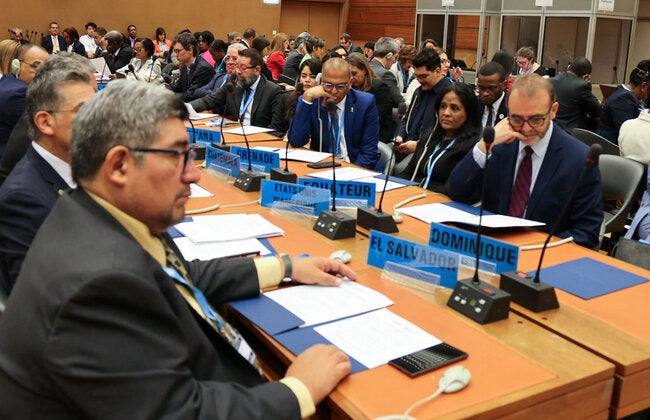Geneva, May 28, 2024 (PAHO/WHO) – Ministers of health and high-level health authorities from the Americas have come together this week for the 77th World Health Assembly in Geneva, Switzerland, to discuss pressing health issues, including amendments to the International Health Regulations (IHR) and the creation of a global instrument on pandemic prevention, preparedness and response.
Here are some highlights of their interventions:
Chile: Responding to new challenges facing global health
While Chile has managed to rebuild the capacity of its public health system following the COVID-19 pandemic, as well as emergencies such as forest fires and floods, the country continues to experience a backlog in health care services, the Minister of Health of Chile, Ximena Aguilera, said.
“We have improved access to mental health care, including for health care workers,” and “reduced out of pocket spending with our zero co-pay strategy,” she added.
At the global level, Minister Aguilera welcomed “a consensus-based instrument for pandemic prevention, preparedness and response, based on the principles of equity, solidarity, sovereignty and respect for human rights.”
Chile also looked forward to reaching consensus with the amendments of the International Health Regulations (IHR). “Collaboration in finding effective solutions will be vital to respond to the new challenges facing global health.”
Argentina: Strengthening international capacities for pandemic response
Regarding the negotiations that will take place during the 77th World Health Assembly, the pandemic agreement, and the amendments to the IHR, Silvia Prieri, Chief of Staff of the Ministry of Health of Argentina, underscored that “Argentina’s priorities have always been to achieve an international agreement” and to “strengthen international capacities for pandemic response, promoting technological development and scientific collaboration.”
Prieri highlighted Argentina’s ongoing work on a variety of strategic issues, including “digitalizing health systems, strengthening supply chains, combatting antimicrobial resistance, and promoting health research and development.”
The Chief of Staff also underscored that while Argentina “supports the WHO’s mission as the directing and coordinating body on health,” it has concerns regarding the process of amending the IHR 2005.
“It is important to move forward with sustainable commitments for developing countries in particular.”
Canada: Closing health equity gap
“A meaningful pandemic agreement is consensus based and one all member states can agree on,” Chief Public Health Officer of Canada, Theresa Tam, said.
Canada remains committed to working together to prevent and minimize the consequences of health emergencies and pandemics, and “urges all member states to support WHO’s emergencies work.”
“Everyone everywhere should have the best level of care possible to promote wellbeing and prosperity,” she said.
Tam underscored Canada’s commitment to addressing health equity globally and addressing the root causes of ill health. “Together, we must improve health promotion efforts to reduce disease burden and foster mental and physical health and wellbeing.”
For Canada, an integrated approach to health service delivery requires inclusion of nutrition, sexual and reproductive health and rights, and routine vaccination.
“Gender equality is foundational to a peaceful, prosperous, and sustainable future for all. Let us continue to fight racism, sexual and gender-based violence, and discrimination against marginalized groups including LGBTQI+ people, women and girls,” she said.
Uruguay: A historic opportunity
Following the COVID-19 pandemic, the Minister of Public Health of Uruguay, Karina Rando, highlighted the need for countries to work together to strengthen the global health architecture.
“For Uruguay, the negotiations taking place to amend the IHR and the negotiations for a new pandemic agreement are a historic opportunity for the international community, defining a legal framework to enable us to work together to prevent a future pandemic,” and “guarantee access to affordable medications, information and technology to enable us to respond better to such pandemics,” she said.
“We must continue to strengthen dialogue, exchange, search for peace and ensuring the right to health for all.”
Primary health care is also an important issue for Uruguay, as is intelligent health spending, with a focus on access to medicines and new technologies.
Rando also underscored mental health as another important issue that has worsened since the COVID-19 pandemic. “Uruguay is investing strongly in an integral plan for the prevention and treatment of mental health problems and addictions.”
Mexico: We cannot forget the lessons of the pandemic
“We cannot expect a better future unless we deal with the deep underlying inequalities that divide us. Inequity undermines health and, in particular, timely affordable access to medicines and health products,” Francisca Elizabeth Mendez Escobar, P

